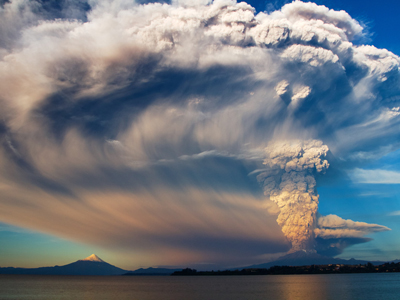Volcanic eruptions are hazards resulting from tectonic activity. During your GCSE geography lessons, you will have made a case study of a volcanic eruption. For your exams, you need to know what causes an eruption, the primary and secondary effects and that these can be positive as well as negative. You should also know and understand the immediate and long term responses and how volcanic eruptions are monitored. Millions of people throughout the world live close to volcanoes and benefit from them. Managing the hazards from volcanoes is necessary to their survival.
The Earth's crust is extremely thin compared to the overall size of the planet and is cracked into large plates. These plates move around, driven by convection currents in the Earth's mantle.
As they move, they collide, move apart and slide sideways past each other, creating earthquakes and volcanoes close to their boundaries. When the volcanoes erupt, the materials produced by the eruption can be hazardous.
There are several different types of volcano, two common types are shield and composite cone. Eruptions from shield volcanoes tend to be less explosive than from composite cone volcanoes because the lava is much less viscous. Ash is erupted and is carried high into the air by the rising air above the volcano. This is a hazard to aviation and flights are sometimes diverted or even cancelled when there is a large eruption beneath an air corridor. As the lava cools and solidifies, new crust is formed. Where this happens on land, the lavas will eventually weather, forming mineral-rich soils.
Eruptions occur when magma reaches the surface of the Earth. Magma is intensely hot and the heat is transferred into the rocks around the rising magma. Any groundwater that is circulating will be heated and where the water reaches the surface, it becomes a hot spring. Some of these are cool enough to supply warm water for public baths, something that was noticed and often used by the Roman Empire. During the eighteenth and nineteenth centuries, hot springs became very popular with the middle and upper classes who believed that the mineral-rich warm water had health-giving properties. In the UK, although there are currently no volcanoes, heat from magma deep in the crust still warms groundwater in some places.
Volcanic eruptions are entirely unpredictable and the best that monitoring can do is to alert the authorities shortly before an eruption occurs. Volcanoes that are close to centres of populations are the most-closely monitored, for example Mt. Etna in Sicily. Scientists look for clusters of small earthquakes (caused by the magma pushing its way upwards through the crust), an increase in temperature around the volcano and any sudden increase in gases given off by the volcano. The only effective management for most eruptions is to evacuate the area. In MEDCs, the emergency services can be mobilised very quickly, so medical aid and shelter can reach the stricken area soon after the eruption. In LEDCs, it takes a lot longer. Often the bulk of the aid will be donated by MEDCs which takes time to organise. That means more people are likely to die, either as a result of the eruption, from untreated injuries, infections or even disease.








